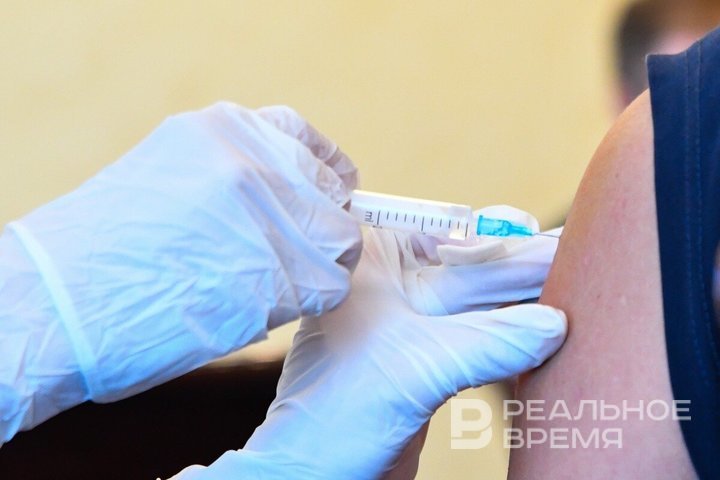Leyla Fazleyeva: ‘The supply of low-quality products cannot be hushed up!’
Russia’s consumer rights protection watchdog warned of the threat of worsening the epidemiological situation in Tatarstan due to the increase in refusals to vaccinate
Achievements and anti-records in sanitary supervision and control in 2024 were discussed in Kazan at the final board meeting of the republican office of Russia’s consumer rights protection watchdog. Head of the agency Marina Patyashina spoke about the “headache” of sanitary doctors — anti-vax parents, agricultural producers who fell ill as a result of sabotage, the obligation to examine workers and livestock for brucellosis and the most common reasons for citizens to contact the department. Read more about the meeting in a report of Realnoe Vremya.
Overseas fever and measles are on the rise
The incidence of West Nile fever in Tatarstan has increased 10 times in 2024, Marina Patyashina, head of the Tatarstan office of Russia’s consumer rights protection watchdog, reported at the final board meeting of the agency. Residents of the republic suffered from non-exotic, but much more common community-acquired pneumonia in 2024 2.6 times more often, measles — 2.4 times, enterovirus infections — by 96%, chronic viral hepatitis — by 64.5%, salmonella infections — by 41.8%, acute hepatitis B — by 28.6%.
Some consolation in this situation can be the fact that, compared to 2023, there was a decrease in the incidence of haemorrhagic fever with renal syndrome by 2.2 times, scarlet fever — by 45.7%, acute hepatitis C — by 19.2%, acute intestinal infections of established origin — by 16.6%, tick-borne borreliosis — by 14.6%, tuberculosis — by 13.7%, acute respiratory viral infections — by 12.5%, HIV infection — by 12.4%, syphilis — by 12%.

“15 articles of the Code of Administrative Offenses of the Russian Federation were applied for identified violations of sanitary legislation in the foci of infectious diseases, 1,234 protocols on administrative offenses were drawn up, including 95 protocols on legal entities, decisions were made to impose fines in the amount of 2,814,660 rubles,” Patyashina reported.
“A significant number of children without vaccinations will lead to a complication of the epidemiological situation”
Marina Patyashina spoke about anti-epidemic measures — vaccination, in particular about vaccinations against measles. During the catch-up immunization, 58,312 people were vaccinated — 21,853 children, 4,998 adults and 31,461 migrants, and in measles outbreaks — 3,144 contacts, which, however, amounted to only 70.7% of the target contingent.
She emphasised that the increasing number of refusals to immunise are causing major problems.

According to the head of the department, 91 students and 13 teachers were not vaccinated against measles at the school, and only the removal of unvaccinated individuals from school and work made it possible to prevent the widespread spread of the infection.
“Refusals to vaccinate against measles also occur in other general education organisations, especially in Kazan,” she noted. “The department issued orders to 63 Kazan schools with extremely low immunisation levels.”
The implementation of the preventive vaccination plan in the republic in 2024 was 110%, and the overfulfilment was caused by the implementation of catch-up immunisation against measles due to a shortage of vaccines in 2023.
And the real problem in the fight against infections was the parents' objections to vaccinations — this was the reason for refusing vaccination in 33% of cases.
“In nine regions of the republic, the problem of refusals is extremely acute,” said Patyashina. “In two of them, namely Mamadysh and Cheremshan districts, they were able to vaccinate only less than 10% of the total number of those who refused vaccinations. A significant number of children without vaccinations will sooner or later lead to a complication of the epidemiological situation.”
Farmers were twice as likely to suffer from brucellosis
Vaccination refusals have become a problem not only with measles cases — the lack of discipline among agricultural producers has led to a more than twofold increase in brucellosis cases.
In 2024, 22 cases of acute brucellosis were registered in Tatarstan among workers of peasant farms, compared to 10 cases in 2023. This was facilitated by violations of sanitary rules, including the lack of mandatory testing of employees for brucellosis, personal protective equipment and conditions for maintaining personal hygiene, Marina Patyashina reported. As a result, in December 2023, the republic received the status of an “unfavourable” territory (for brucellosis).
The regional office of the watchdog issued orders to 1,165 livestock farms for mandatory serological testing of employees for brucellosis, but only 623 farms completed them within the established deadline.
Claims against banks are growing
Marina Patyashina spoke about the work of the agency with citizens' appeals on issues of consumer rights violations. In 2024, 8,826 of them were received — this is 16% more than in 2023. The chief sanitary doctor of the Republic of Tatarstan noted the continuing trend of growth in the number of appeals related to the violation of consumer rights in the provision of services — by 68% (while the number of complaints about trade increased by 32%).
Answering a question from Realnoe Vremya before the start of the meeting, Marina Patyashina clarified that the largest number of complaints about the service sector from citizens are caused by banks:
“We are talking about the imposition of services by financial organisations. The share of such requests amounted to 33% of the total number, but slightly decreased compared to 2023, when they amounted to 36%.”

At the same time, the watchdog recorded an increase in complaints about the quality of educational services — they amounted to 14% against 2% in 2023. The share of requests for communication services increased slightly over the year — from 9 to 10%. And in the trade sector, the share of requests concerning the sale of goods remotely decreased by 2% — to 38%.

“The key indicator of state supervision in the field of consumer protection is the volume of damages compensated to citizens,” stressed Patyashina, “and in 2024, the agency reached 40%. Consumers voluntarily returned funds in the amount of 126,958 million rubles. In addition, during the consideration of citizens' appeals, signs of violation of mandatory requirements were identified in the actions of business entities in 603 cases, and warnings were issued to all persons.”
In total, in 2024, the number of warnings issued to supervised persons about the inadmissibility of violating mandatory requirements, including for the facts indicated in the appeals, amounted to 3,453, which exceeded the 2023 figure by 6%. Most often, warnings were issued to retail enterprises in 2024.
“Holiday” in children's institutions
The results of the meeting were summed up by Deputy Prime Minister of Tatarstan Leyla Fazleyeva who took part in the board meeting. She noted the important role of preventive immunisation in the work of the watchdog and doctors and highlighted the need for joint work in this area with the parent community.
In her speech, she highlighted an important issue — the quality of food, and in particular hot meals in children's organisations.

“Mrs Patyashina outlined the catastrophe that occurred at one of our facilities, and we understand that those delegations that come to the republic, whether they are children or adults, of course, should not leave the republic after eating or drinking something wrong,” said Leyla Fazleyeva.
She noted with satisfaction the change in such an indicator as the number of notifications of violations in the supply of products.